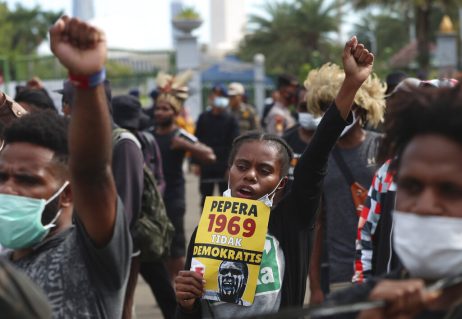- Beranda
- Berita dan Politik
Indonesia’s Papua Region at Risk of Mass Violence, Report Claims
...
TS
mabdulkarim
Indonesia’s Papua Region at Risk of Mass Violence, Report Claims
The Simon-Skjodt Center for the Prevention of Genocide claims that the region bears many of the structural risk factors associated with past mass atrocities.

Papua, the easternmost region of Indonesia, displays a number of “early warning signs” of mass atrocities, linked to the unresolved grievances of Indigenous Papuans and the worsening conflict between pro-independence insurgents and the Indonesian state, claims a group working to prevent future genocides.
In a report released last week, the Simon-Skjodt Center for the Prevention of Genocide at the United States Holocaust Memorial Museum argued that the situation in Indonesia’s easternmost region bore worrying resemblances to other regions that have experienced genocides and other mass atrocities.
Tensions have simmered in Papua since 1969, when the region was incorporated into Indonesia following a flawed United Nations referendum. But the situation has markedly worsened in recent years, as the deepening encroachment of the Indonesian state has prompted growing numbers of attacks by pro-independence insurgents. The most recent of these came last week when nine people were shot dead in a suspected attack by armed separatists in Nduga Regency, in the Papuan highlands.
Papua province in particular has become increasingly militarized as the government has strengthened the security presence in the region in response to separatist attacks. In November 2020, the regional U.N. Human Rights Office expressed its concern about the “escalating violence” and “the increased risk of renewed tension and violence.”
The report was produced as part of the Simon-Skojdt Center’s Early Warning Project, which aims to highlight situations where mass atrocities – “large-scale, systematic violence against civilian populations” – are not yet taking place but where “early warning signs are apparent.”
While this has not yet escalated to large-scale violence against civilians, “early warning signs are visible and warrant our attention,” the Simon-Skojdt Center said in a statement accompanying the report’s release.
“The risk of large-scale violence in Papua persists – and may be rising – even as Indonesia continues to grow in population, wealth, and international political influence,” the report stated.
The report, which was based on field research in Papua and other parts of Indonesia from March to August 2021, said that the current situation featured three precipitating factors that have been identified in past episodes of mass violence: a recent cycle of protests, riots, and communal mobilization; increasing divisions among indigenous Papuans, which “could increase the vulnerability of pro-independence civilians to attacks and/or lead pro-independence groups to contemplate extreme measures… to foster greater unity”; and the escalating conflict between Papuan rebels and the Indonesian military.
“These divisions and tensions, coupled with the struggle for independence, if not addressed, could lead to further violence against civilians,” the report states.
The present situation is compounded by five structural risk factors identified by researchers: Indonesia’s “extensive history of mass atrocities,” including the massacre of up to a million communists and suspected communists in 1965-66; the exclusion of indigenous Papuans from political decision-making in the region; the exploitation of Papua and West Papua’s natural resources by outsiders and the land conflicts and tensions that have resulted; the implication of military forces in human rights abuses and the lack of accountability; and increasing conflicts between indigenous Papuans and migrants from other parts of Indonesia.
Based on the experience of other nations that have experienced mass atrocities, the report identifies potential triggering events that could lead to violence against civilians. It describes these not as forecasts of the most likely outcomes, but as “‘worst-case scenarios’ that could plausibly occur.”
The first is one in which “pro-Indonesia Indigenous Papuan militia, with the support of the military and police, [commit atrocities] against pro-independence Indigenous Papuans.” The second is one in which Papuan separatists become more cohesive, united, and effective, prompting Indonesian migrants and Indonesian security forces to “commit atrocities against Indigenous Papuans” writ large.
The conflict in Papua rarely gains sustained international attention, in large part because the Indonesian government has so successfully managed to keep journalists and other researchers from traveling there. While this report aims less to predict than to highlight a worrying trend, it is a welcome reminder that the world should start paying closer attention to Asia’s forgotten conflict – before it is too late.
https://thediplomat.com/2022/07/indo...report-claims/
Jadi bahasa lembaga kajian genosida Amerika soal Papua dan ancaman kekerasan masal di daerah ini...
nurade247 dan username2020 memberi reputasi
2
830
31
Tulis komentar menarik atau mention replykgpt untuk ngobrol seru
Mari bergabung, dapatkan informasi dan teman baru!
Berita dan Politik
671.9KThread•41.5KAnggota
Tampilkan semua post
username2020
#1
Wajar karna sudah puluhan tahun bergabung indonesia dan diinjak2 kaum agama mayoritas tapi papua cm dikuras hartanya oleh indonesia dan dimanfaatkan
Terbukti dr tidak adanya org papua yg dpt masuk ke jajaran presiden atau bahkan hanya sebagai calon
Karna papua yg memiliki latar belakang agama minoritas pasti dikucilkan oleh org pribumi indonesia
Satu kata merdeka
Enough is enough
Keberagaman adalah tipu daya yg melukai hati rakyat papua
Terbukti dr tidak adanya org papua yg dpt masuk ke jajaran presiden atau bahkan hanya sebagai calon
Karna papua yg memiliki latar belakang agama minoritas pasti dikucilkan oleh org pribumi indonesia
Satu kata merdeka
Enough is enough
Keberagaman adalah tipu daya yg melukai hati rakyat papua
judogal dan 4 lainnya memberi reputasi
1
Tutup